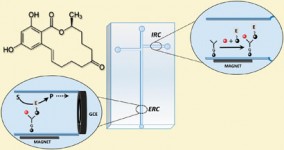 Scientists from Spain have used a lab on a chip device to quickly analyse levels of zearalenone, a contaminant, in infant foods with a detection limit below legislative requirements.
Scientists from Spain have used a lab on a chip device to quickly analyse levels of zearalenone, a contaminant, in infant foods with a detection limit below legislative requirements.
Alberto Escarpa and his team from Alcala University, in Madrid, have made a microfluidic device that can detect zearalenone levels to well below the maximum legal amount.
Read Elinor Richards’ full news story in Chemistry World, and access the full paper for free below:
Integrated electrokinetic magnetic bead-based electrochemical immunoassay on microfluidic chips for reliable control of permitted levels of zearalenone in infant foods
Mirian Hervás, Miguel A. López and Alberto Escarpa
Analyst, 2011, Advance Article
DOI: 10.1039/C1AN15081B










